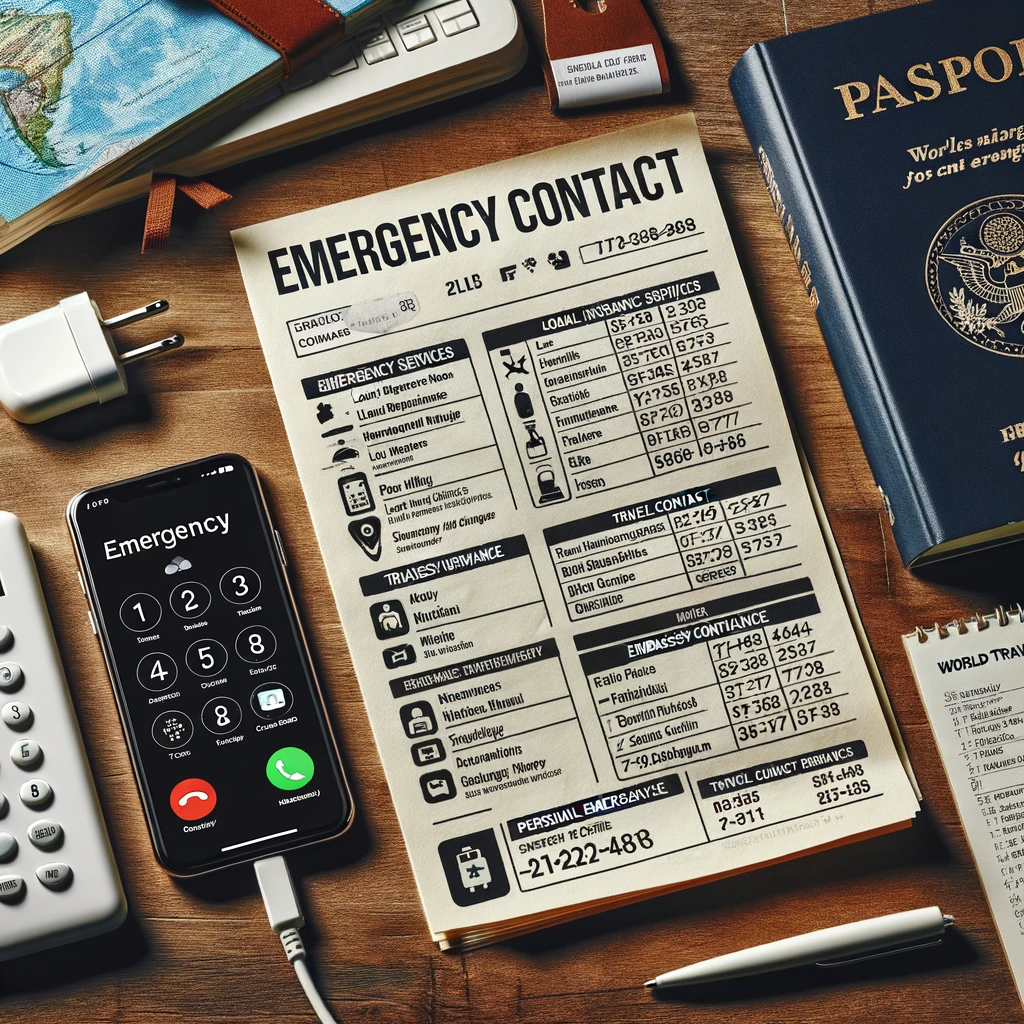Check Travel Advisories using the travel.state.gov link below. Please Be Safe.
https://travel.state.gov/content/travel/en/traveladvisories/traveladvisories.html/If you decide personally that its safe where you are going then check out:
Traveling the world is a dream come true for many, offering opportunities to explore new cultures, landscapes, and experiences. However, safety should always be a top priority for every traveler. Whether you’re a seasoned globetrotter or embarking on your first adventure, understanding how to stay safe during your travels is essential. In this article, we’ll delve into a wide range of safety tips for travelers, covering everything from planning and packing to staying safe on the road and navigating unfamiliar destinations.

Section 1: Preparing for Your Trip
Before you even leave your home, there are several crucial steps you can take to ensure a safe and enjoyable journey.
1. Research Your Destination
- Country-Specific Information: Familiarize yourself with the political climate, local laws, customs, and any potential safety concerns in your destination.
- Travel Advisories: Check government travel advisories from your home country for any warnings or alerts about your chosen destination.
2. Travel Insurance
- Purchase Adequate Coverage: Invest in comprehensive travel insurance that covers medical emergencies, trip cancellations, and lost or stolen belongings.
- Read the Fine Print: Carefully review the terms and conditions of your policy to understand what is and isn’t covered.
3. Vaccinations and Health Precautions
- Consult a Healthcare Professional: Visit a travel clinic or your healthcare provider to ensure you’re up to date on vaccinations and discuss any health precautions relevant to your destination.

4. Document Copies
- Duplicate Important Documents: Make photocopies or digital copies of your passport, visa, driver’s license, and other essential documents. Store these separately from the originals.
- Emergency Contacts: Keep a list of emergency contacts, including your embassy or consulate’s contact information, in case you need assistance while abroad.
Section 2: Packing and Luggage Safety
What you pack and how you manage your belongings during your travels can significantly impact your safety and peace of mind.
5. Packing Considerations
- Lighten Your Load: Travel with only the essentials to avoid lugging around heavy bags, which can attract unwanted attention and increase the risk of injury.
- Hidden Pockets: Use clothing with hidden pockets for storing valuables such as money, passports, and credit cards.

6. Locks and Security
- Luggage Locks: Secure your luggage with TSA-approved locks to prevent unauthorized access.
- Cable Locks: Use cable locks to secure bags together when storing them in hotel rooms or train compartments.
7. Carry-On Essentials
- Valuables in Carry-On: Never check in essential items like medications, electronics, and important documents. Keep them in your carry-on bag.
- Medication: Carry necessary medications in their original containers, accompanied by a doctor’s prescription.
Section 3: Staying Safe on the Road
Once you’re on the road, it’s vital to take precautions to ensure your safety throughout your journey.
8. Transportation Safety
- Choose Reputable Operators: When selecting transportation services, opt for well-known and reputable companies with positive reviews.
- Seatbelts and Helmets: Ensure you use seatbelts in cars and wear helmets when cycling or riding motorcycles.
9. Local Laws and Customs
- Respect Local Norms: Familiarize yourself with the customs and laws of your destination to avoid unintentional disrespect or legal issues.
- Legal Documents: Always carry proper identification and travel documents, as authorities may request them.
10. Avoid Risky Areas
- Research Neighborhoods: Know which areas are considered safe for tourists and which are best avoided.
- Late-Night Travel: If possible, avoid walking alone at night, especially in unfamiliar areas.
11. Personal Security
- Be Discreet: Avoid displaying expensive items like jewelry or electronics that may make you a target for theft.
- Use ATMs Wisely: Choose ATMs in well-lit and busy areas, and shield your PIN while entering it.

12. Emergency Contacts
- Keep a Contact List: Have a list of local emergency numbers, your embassy or consulate’s contact details, and your family’s contact information.
- Local Support: Know where your country’s embassy or consulate is located in your destination.
Section 4: Cybersecurity and Data Safety
In the digital age, it’s essential to protect your data and online presence while traveling.
13. Secure Your Devices
- Password Protection: Use strong, unique passwords for your devices, accounts, and email.
- Two-Factor Authentication: Enable two-factor authentication on your accounts for an extra layer of security.
14. Public Wi-Fi
- Use a VPN: When connecting to public Wi-Fi, use a Virtual Private Network (VPN) to encrypt your internet connection.
- Avoid Sensitive Transactions: Avoid accessing sensitive data or making financial transactions on public networks.
15. Back Up Data
- Data Backup: Regularly back up your data to a secure location or cloud service to prevent data loss in case of theft or loss.
Section 5: Health and Safety While Traveling
Maintaining good health while traveling is essential for an enjoyable trip. Here are some health and safety tips to consider.
16. Food and Water Safety
- Safe Dining: Eat at well-reviewed restaurants or places recommended by locals to reduce the risk of foodborne illnesses.
- Bottled Water: Drink bottled water or use a water purifier if tap water is not safe for consumption.

17. Travel Health Kit
- Medications: Carry a travel health kit with essential medications, first-aid supplies, and any personal prescriptions.
- Insect Repellent: Protect yourself from insect-borne diseases by using repellent and wearing long sleeves and pants.
18. Travel Insurance Coverage
- Medical Emergency: Know the extent of your travel insurance’s coverage for medical emergencies, and understand how to access care.
Section 6: Cultural Awareness and Communication
Understanding and respecting the local culture is key to staying safe and having a positive travel experience.
19. Learn Basic Phrases
- Local Language: Learn a few basic phrases in the local language to facilitate communication and show respect.
- Nonverbal Communication: Understand local nonverbal cues and gestures to avoid misunderstandings.
20. Blend In
- Dress Appropriately: Dress modestly and in accordance with local customs, particularly when visiting religious sites.
- Respect Traditions: Be respectful of local customs and traditions, even if they differ from your own.
Section 7: Traveling Solo and Personal Safety
For solo travelers, safety concerns may differ, but many of the same principles apply.
21. Solo Travel Considerations
- Share Itinerary: Let someone at home know your itinerary and keep them updated on your location.
- Stay in Public Areas: Avoid isolated places, particularly after dark, and use well-lit paths and streets.
Section 8: Emergency Preparedness
No matter how well you plan, emergencies can still happen. Being prepared is key to handling unexpected situations.
22. Travel Insurance Information
- Carry Your Insurance: Keep your travel insurance information and policy number readily accessible at all times.
- Emergency Evacuation: Ensure your policy covers emergency medical evacuation in case it’s needed.

23. Emergency Cash
- Hidden Cash: Keep a small amount of emergency cash hidden in a separate location from your wallet or money belt.
24. Local Contacts
- Local Friends or Contacts: If you have local friends or contacts, let them know about your travel plans and stay in touch with them.
- Local Authorities: In the event of an emergency, contact local authorities or your country’s embassy or consulate.
Section 9: Responsible Travel and Environmental Safety
Responsible and environmentally-conscious travel can make a significant impact on the places you visit.
25. Respect the Environment
- Leave No Trace: Follow the principles of Leave No Trace by not disturbing the environment and properly disposing of waste.
- Wildlife Interaction: Do not disrupt or interfere with local wildlife or ecosystems.
26. Support Local Communities
- Local Economy: Contribute to the local economy by supporting local businesses, artisans, and tour operators.
- Sustainable Practices: Choose eco-friendly accommodations and tour operators who practice responsible tourism.
Section 10: Post-Trip Safety and Reflecting on Your Journey
Your safety concerns don’t end when you return home. It’s essential to reflect on your journey and ensure you’ve taken all necessary post-trip safety measures.

27. Review Your Experience
- Reflect: Take time to reflect on your travel experience, including what went well and areas where you can improve.
- Feedback: Provide feedback to your travel insurance provider or tour operator to help enhance safety measures.
28. Security Upon Return
- Secure Your Home: Ensure your home is secure by locking doors and windows and addressing any maintenance concerns.
- Change Passwords: Change passwords for accounts or devices used during your travels.
Conclusion
Traveling is a remarkable opportunity to explore the world, learn about different cultures, and create lasting memories. However, ensuring your safety while traveling is of utmost importance. By preparing before your trip, staying vigilant during your journey, and maintaining awareness of local customs and laws, you can help ensure a safe and memorable travel experience. Remember that safety is not just about avoiding risks; it’s also about making informed decisions and embracing your journey with confidence and peace of mind.
